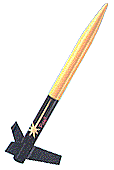| Construction Rating: | starstarstarstar_borderstar_border |
| Flight Rating: | starstarstarstarstar |
| Overall Rating: | starstarstarstarstar_border |
| Diameter: | 0.79 inches |
| Length: | 11.25 inches |
| Manufacturer: | Quest  |
| Skill Level: | 1 |
| Style: | Sport |
 Brief:
Brief:
This rocket uses the typical plastic streamer tied to the shock cord.
Construction:
This is a very typical 3FNC rocket that is good for the beginner. All parts were in the bag and instructions were easy to follow. Assembly followed a logical order.
This was the first rocket we built that uses Kevlar thread tied to the engine block. The shock cord is then tied to the Kevlar thread. You must cut a small groove into the engine block ring. Before inserting the motor mount tube into the body tube, the Kevlar thread is tied to the engine block ring and run through the groove you created. The instructions do a good job of showing this whole procedure. Just make sure that the loose end of the Kevlar thread is coming out the top of the rocket so you can tie the shock cord to it. The motor tube fits into the body tube without the use of centering rings.
A guide is provided to mark the body tube for the fins. The body tube is not slotted so the fins are glued to the tube and then reinforced with a glue fillet. Fins are balsa and already die-cut in the balsa sheet.
The fins are swept forward on this rocket so when you're finished, you can't stand the rocket vertically on the fins. The lowest protruding point is the motor retention clip. You'll need to use a display stand of some sort if you want to display this rocket.
A single launch lug is glued to the side of the body tube. Assembly is finished by tying one end of the elastic shock cord to the plastic nose cone and the other end to the Kevlar thread. The bright colored plastic streamer is then tied to the shock cord.
Finishing:
The package shows this rocket painted with a black bottom half and yellow top half. There is one clear self-adhesive decal that says "Flash" in skinny red letters. We painted our rocket black and gold and it was almost impossible to see the decal. It didn't stand out anything like the package showed.
Construction Rating: 3 out of 5
Flight:
This is an excellent flying rocket. It jumps off the pad nice and straight. We usually use it as the first flight of the day. A B6-4 motor will send it just about out of sight. A C6 or C5 definitely sends it out of sight and can make it very hard to track for recovery.
Recovery:
I definitely prefer the Kevlar thread/elastic shock cord technique over the traditional method of gluing the shock cord to the inside of the body tube. We have yet to have the shock cord/nose cone completely separate from the body. The streamer works well for this rocket because of the lightweight and high altitudes. A small parachute could be used but may send it drifting a good distance downrange.
Flight Rating: 5 out of 5
Summary:
I like this rocket because of the Kevlar thread shock cord system. It's also very easy to build for a beginner and is a nice high flyer. The only CON is the decal and how it doesn't show up on the rocket.
Overall Rating: 4 out of 5
 |
 |
Flights
 |
 |
B.G.A. (March 2, 2006)
Steve Lindeman (December 17, 2011)
Used this rocket in "B" Streamer Duration Regional competition at S.M.A.S.H. Bash 2008 and placed well for first time compeating although for this event I swapped out the stock streamer for a 3"x42" red & crome mylar streamer. Beautiful flyer and a great competitor that will see many more flights.
 |
 |
B.M. (November 1, 2000)